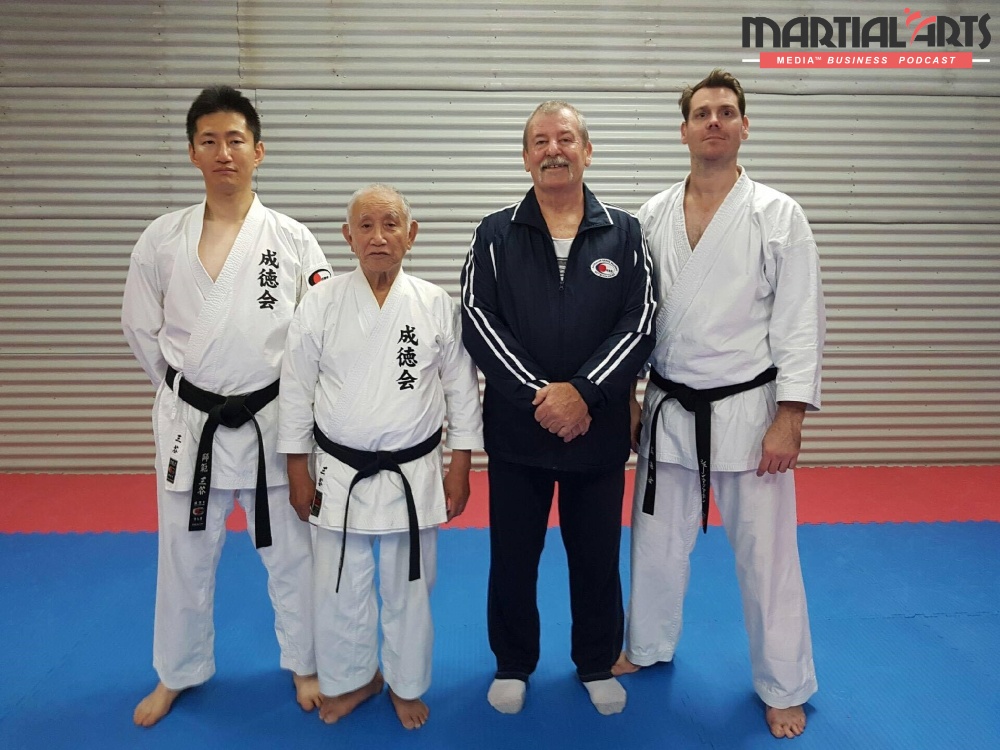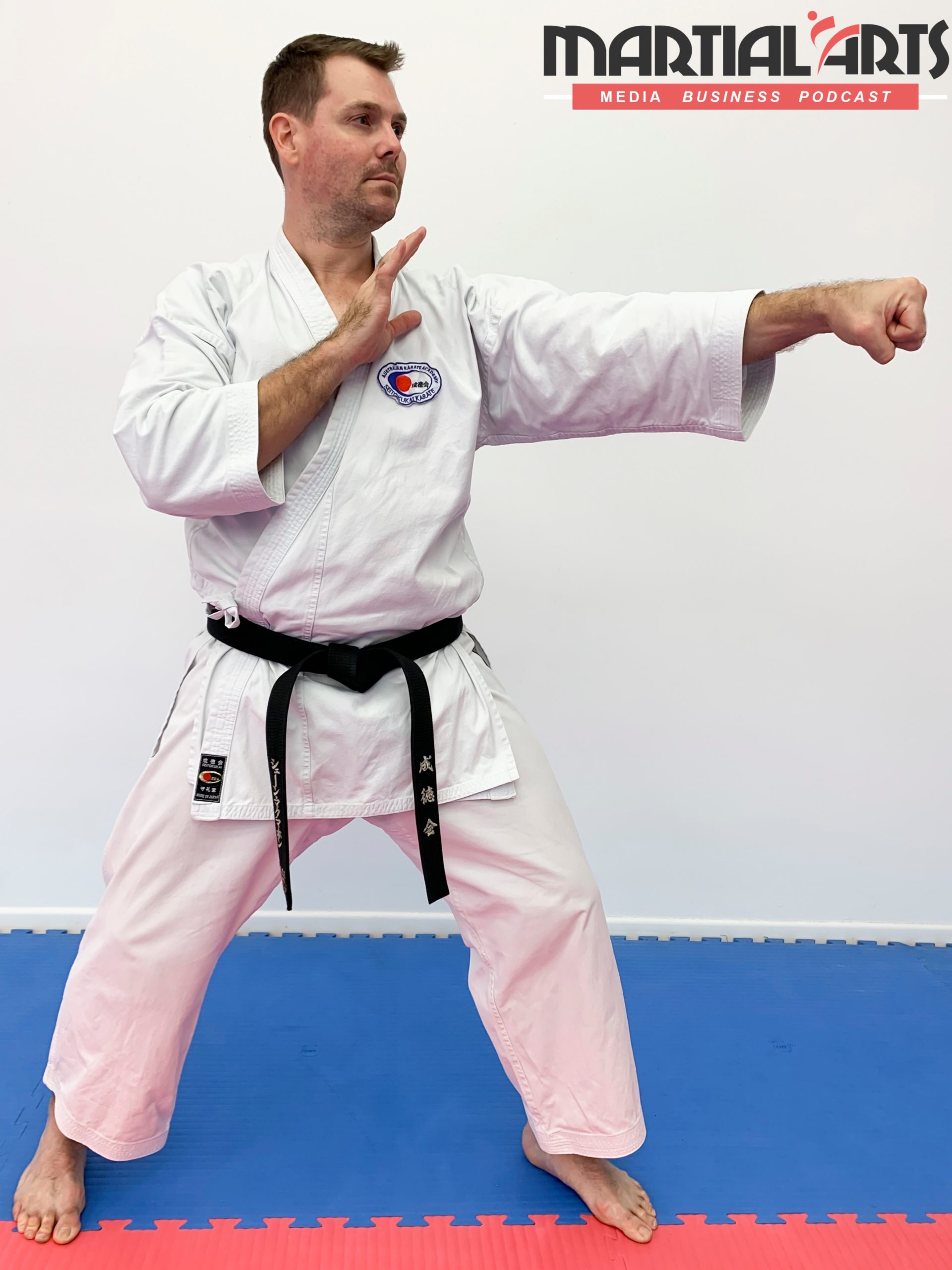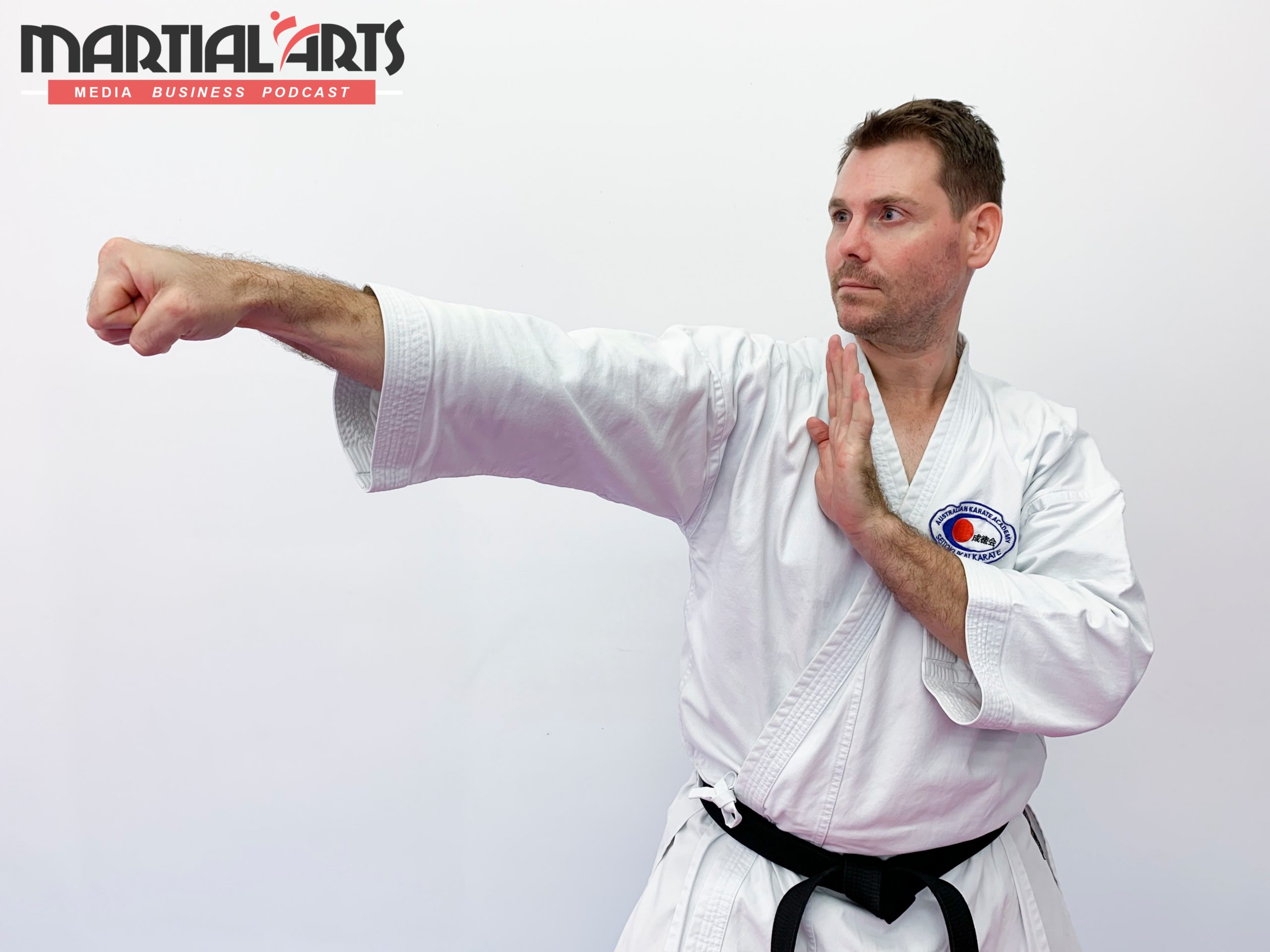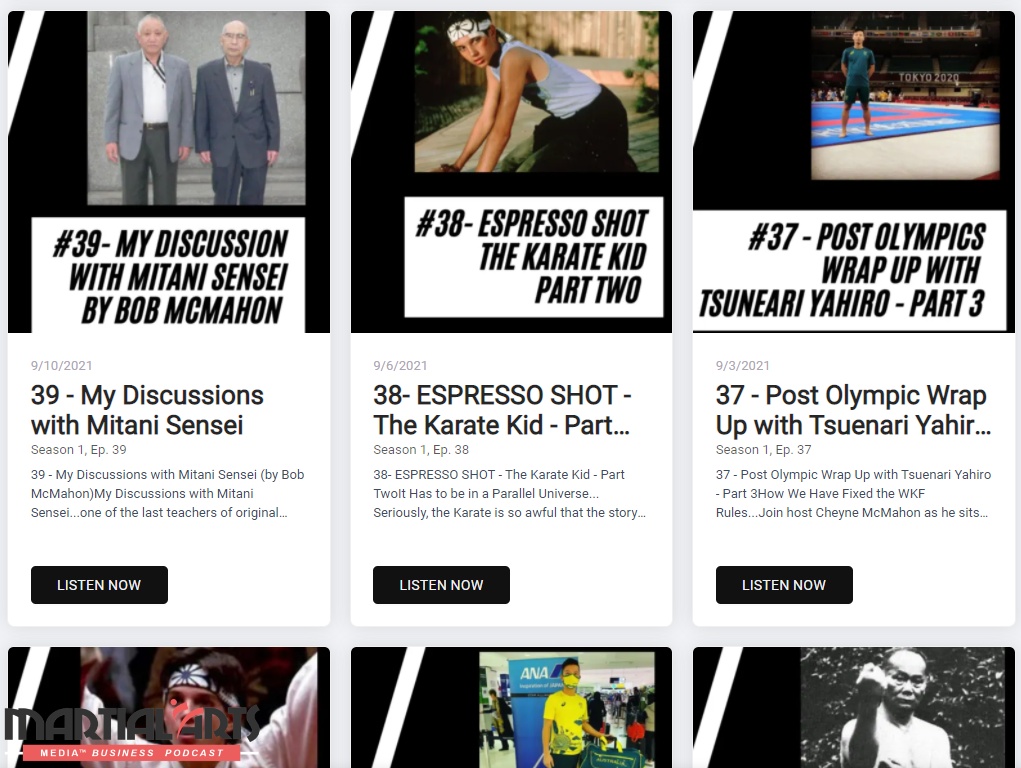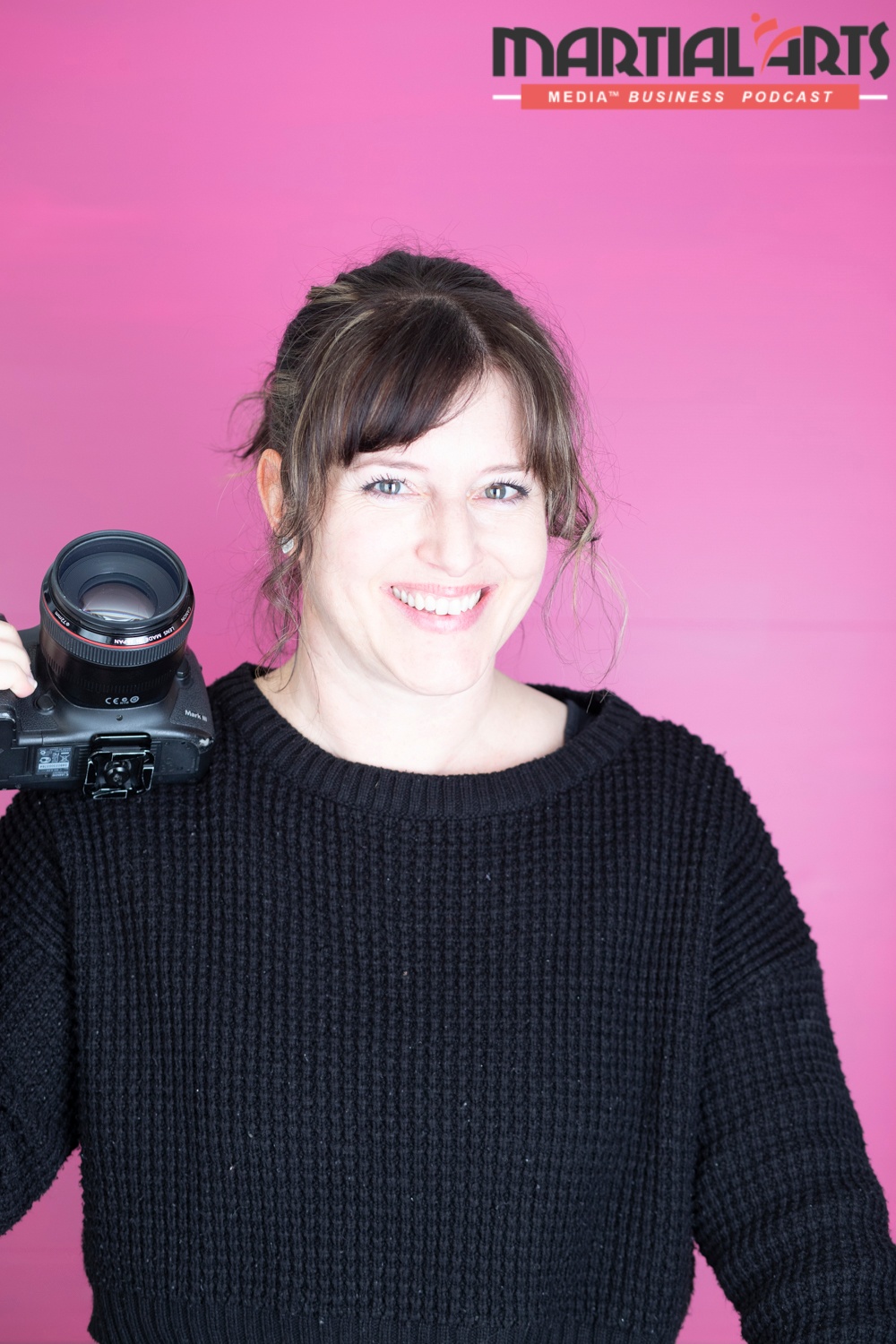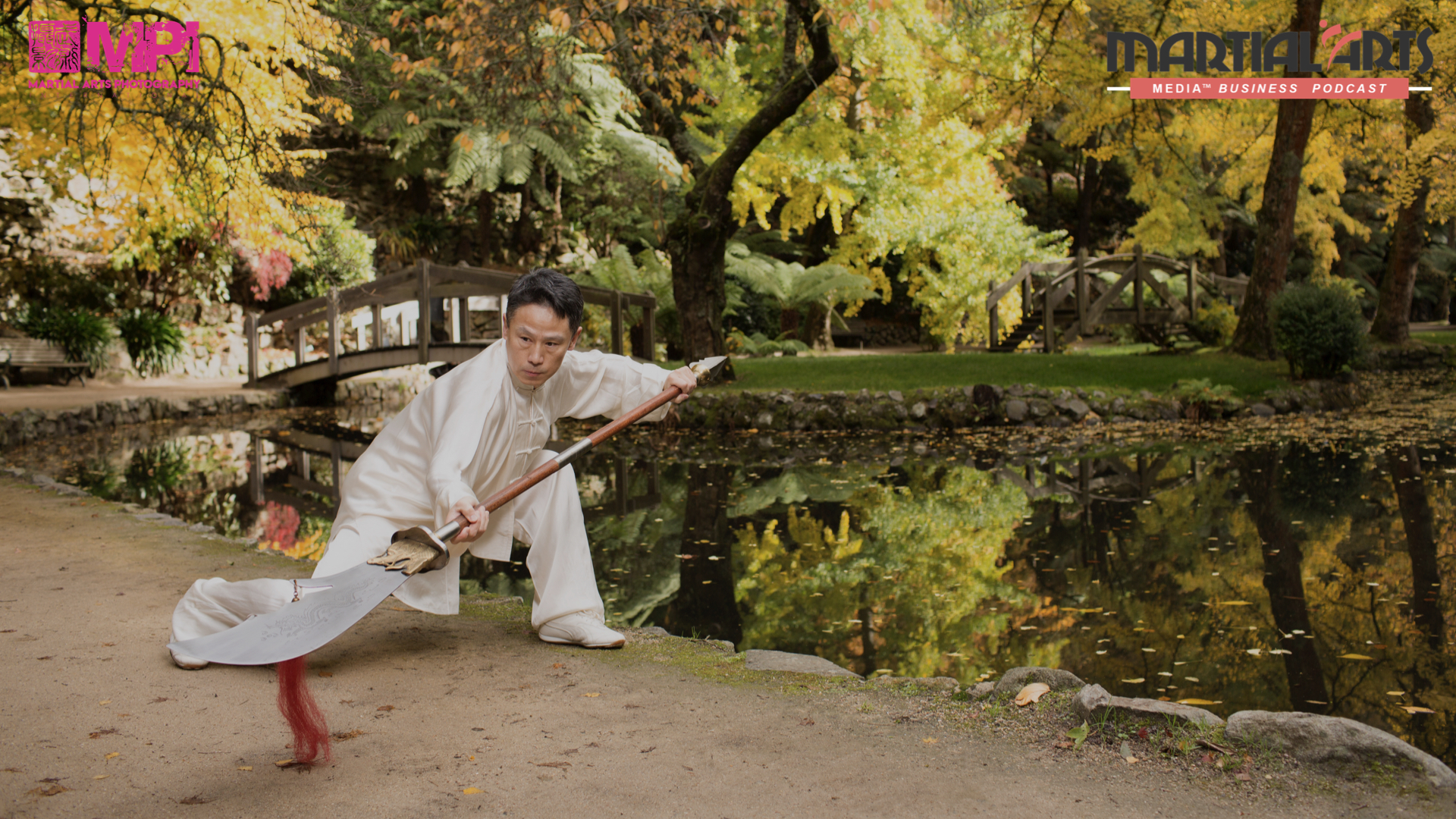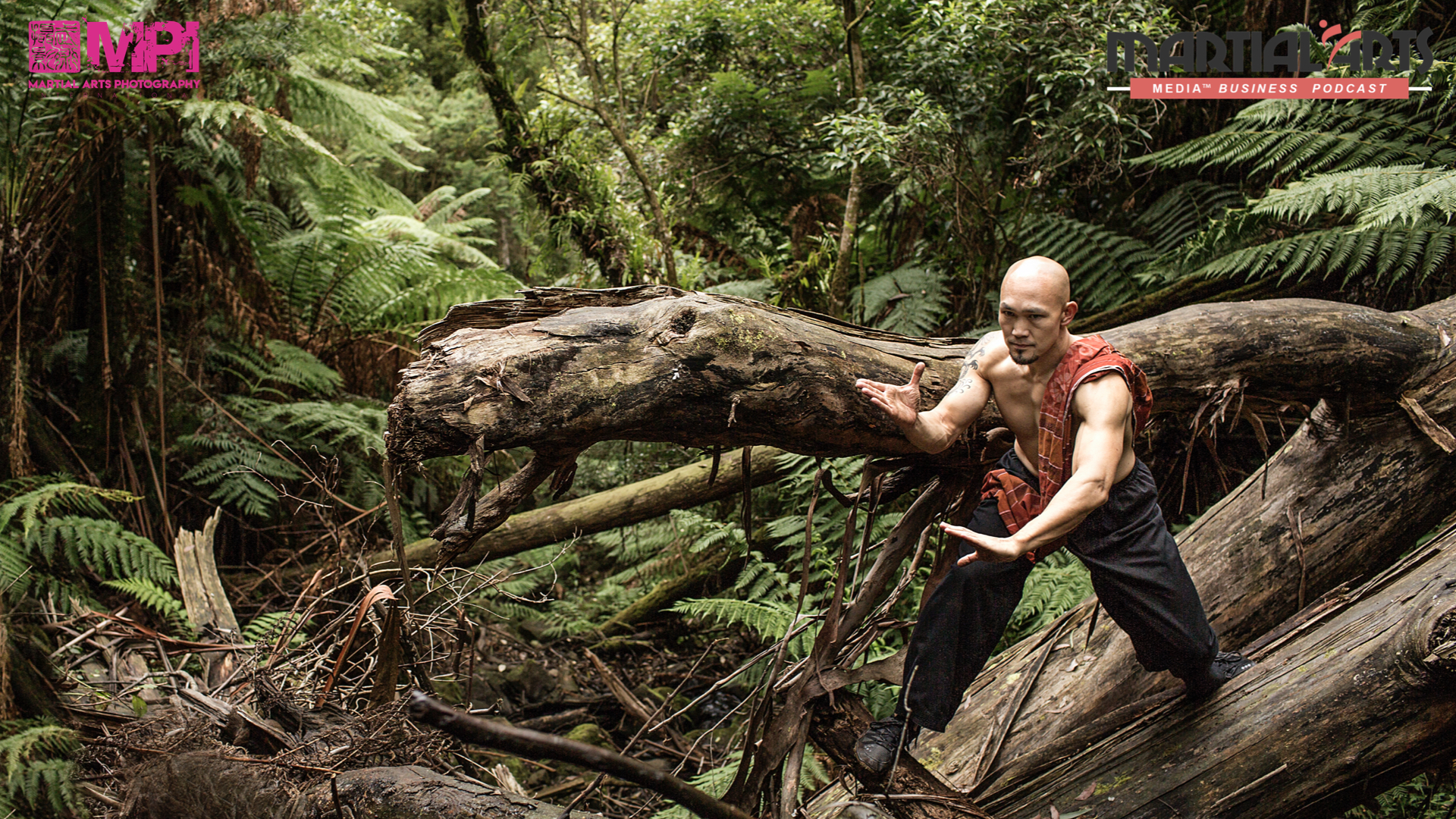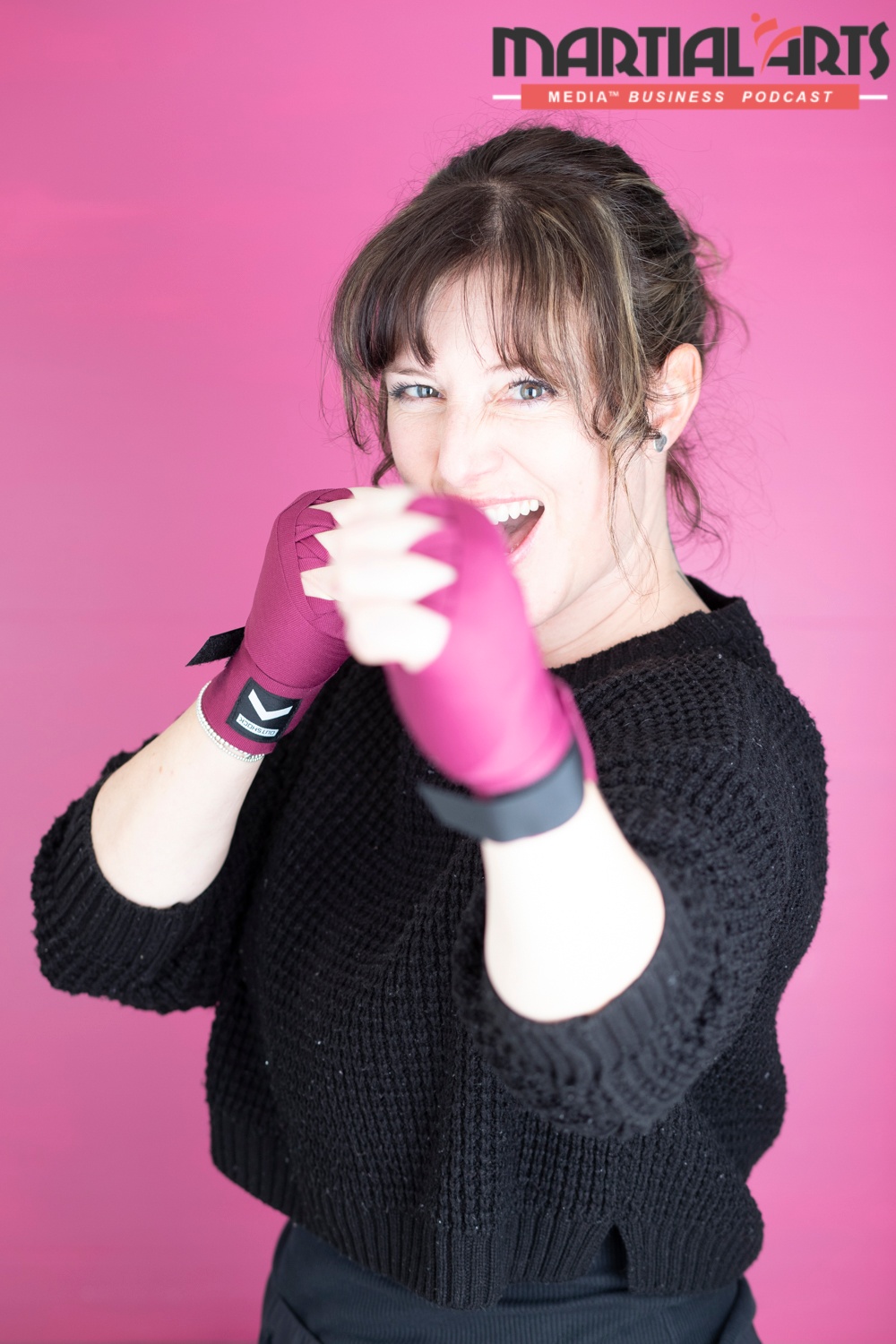Ben Vickers shares his UFC journey, from Eternal MMA’s 14 fight shows on UFC Fight Pass, to Scrappy MMA’s Jack Della Maddalena winning his fight on The Dana White’s Contender Series.
IN THIS EPISODE:
- How the UFC ‘Walks the Talk’ and raises the bar in the industry
- Molding fighters through collaborative coaching style
- Australian champion Jack Della Maddalena’s martial arts success story
- Creating a pathway into the UFC for Australian fighters
- How to navigate flights and borders during restrictions
- The journey to Dana White’s Contender series
- And more
*Need help growing your martial arts school? Learn More Here.
TRANSCRIPTION
I actually think the key and the secret is they're so close as a team that they all want to lift each other up. I never have issues on the mats with ego. Everyone's just there to get better. And it's really proving the results now.
The guys are self-motivated. I don't need to beg them to come into the gym. They're there. They want to be there, and they want to be the best. And they're prepared to put the work in, and it's showing. There is no secret. It's hard work, it's good quality coaching, and it's teamwork.
GEORGE: Hey, George here. Welcome to the Martial Arts Media™ business podcast. So, I've got a repeat guest today. Ben Vickers from Eternal MMA and Scrappy MMA. How are you doing today, Ben?
BEN: Yeah, I'm good. I'm good. I'm enjoying the sunshine in the backyard, so happy day.
GEORGE: Well, last time we spoke, we were grabbing a coffee, but last time we spoke on the podcast, podcast 87, we spoke about Eternal MMA. You just got a deal with the UFC, UFC Fight Pass to have all your shows and everything featured. And I was at… Actually, I just bought a ticket yesterday to Eternal MMA.
Yeah. So Ben and the team run an epic show, Eternal MMA. Real top quality production, great fighters. Kind of see now how you've got to deal with the UFC, but wanted to bring you on to chat about the new development that's happened.
And I guess I could just leave it to you before I maybe go down the wrong path with it. So how have things evolved with the UFC from the last time we spoke?
BEN: It's like anything in business really, I'm learning. I'm a self-investing accidental businessman. I had a passion for martial arts. I competed, and then just by natural progression, I ended up owning an academy, coaching fighters, and then running an MMA event.
So I kind of happened upon this business world, but as I am noticing now, it takes time to establish these business relationships and stuff. So I guess for the last… Since 2019, when we did the October Melbourne event, Eternal 48 debuted on Fight Pass, we've done 14 shows with the UFC. We have regular communications with them. We have a monthly call with them where they fill us in on what they need from us, what they want from us, how we are doing.
And we're doing very well. We're one of the strongest events on the platform. We get great viewership all across the world, which is a testament to the matchmaking because we show in a very bad time zone for the U.S.
Our shows go live sort of 4:00 and 7:00 AM East and West Coast. Sorry, that was the wrong way around. So it's normally 4:00 on the West Coast and 7:00 AM in the East. So it's not a great viewership time for the U.S. market, but we seem to be attracting attention there, which must state that we are doing something right, and people enjoy the entertainment that Eternal's providing.
We've got a big viewership in Europe now. We're the second highest performing platform on show outside of the UFC in Europe, sort of a non-European show, should I say. So everything's going really well, and we're really happy with our partnership.
We've got another deal locked in for next year, and we're in the process of signing another TV deal with another massive sports company. One of the… Probably the foremost sports platform in the world. So things are looking good for Eternal.
GEORGE: Great. Well, congrats I'd say, first and foremost. Does it conflict with the… So you mentioned you got moving… Well, you signed the additional deal. How does that work with the UFC? Do the contracts conflict in any way, or-
BEN: They do.
GEORGE: Do they complement each other?

BEN: They definitely complement each other. The company that we are going to work with works closely with the UFC as well. That's how we've been able to do the deal, so the deal's not signed yet, so I won't say too much about it, but it's in the latter stages of getting signed.
But yeah, there is synergy there, and what's been really nice for our partnership with the UFC is they've actually gone outside of scope a couple of times and sort of waved the exclusivity clause on a couple of things for us, which is kind of unheard of in the market, especially with the UFC being such a juggernaut. They don't normally do that, so they genuinely believe in the term partnership.
In business, partnership, teamwork, gets thrown around all the time by people that want things, I feel, but the UFC sort of really seem to be living up to that, which is great to see. I think in business these days, a lot of people promise you a lot of things, and from my experience, people very rarely deliver, and that's at the core of my business values is delivering on what I say I'm going to deliver on, and I expect the same thing from people that I'm going to work with and partner with.
So it's really nice to see that such a big company has the same respect for us, and it's a two way street, which is probably the first time in my experience that that's ever happened.
GEORGE: Yeah, that's great to hear. They definitely walk the talk. I mean, if you look at all the reporters and all the media, the negative press they get from obviously people trying to chip at the biggest player and critiquing how they pay for their fighters, you see a lot of negativity come around and it's good to hear from someone that's actually in the trenches, working with them on how the partnership is complementing your business and the direction where you guys go.
BEN: Yeah, I don't think you can be as successful as they are without being good at what you do, and you're going to moan about fighter pay and stuff like this, but if you look at what the UFC has done for the sport, I'm probably not sat here if they haven't made the sport as big as what it is because there's that flow down effect, and they're putting in front of everybody's eyes which is filling my gym, which is inspiring people to want to take up martial arts, which is inspiring people to want to come and watch local MMA and see.
And now we've created this pathway. We've had a couple of fighters go from Eternal champion into the UFC, so now we're creating a pathway where people go, “Well, hang on. If I fight in Eternal and I become the champ, there's a chance I can go and fulfill my dreams, and the UFC might pick me up.” So it's nice to have created that pathway for Australia, for Australian martial artists, and hopefully we can start hammering a few more people into the UFC and really get Australian MMA…
Although it's pretty well on the map, I think we can… I think the standard of martial arts and MMA in particular is super high in this country right now, and there's a lot of talent out there, so hopefully we can get that to the big show.
GEORGE: Yeah, so let's talk about that and your most recent trip. I mean, one thing I noticed at Eternal MMA, which is what I didn't know, is you have a bench of really strong fighters. I mean, all the guys from Scrappy MMA that were part of the event were just really, really good to watch.
So you've definitely developed a great team of fighters yourself. So what do you account that for? Is it just experience or is it also painting this pathway, and your team being able to see more of what is actually possible in the sport?
BEN: For me, I believe that… See, I don't think I'm necessarily a great coach. I think I know what I know, and I know how to put that across. I have a collaborative coaching style. I have a lot of very experienced, very talented fighters. We work together.
So their input is taken on board by me. We'll often sit and talk about positions or things that happen in fights and brainstorm it with all the brains that are around, come to the best solution, practice that, make that part of the game, and then move on to the next position that we want to discuss.
So that's a big part of the collaborative coaching effort. It's not a dictatorship. The guys don't turn up and go, “Right, you're doing this, this and this and this.”
We sort of get our minds together. There's many years of experience on my mats now. I have a hugely experienced team of high level guys, so I tap into their knowledge base as much as possible.
BEN: But what I actually think is the key and the secret is they're so close as a team that they all want to lift each other up. I never have issues on the mats with ego. Everyone's just there to get better, and it's really proving the results now. The guys are self-motivated.
I don't need to beg them to come into the gym. They're there. They want to be there, and they want to be the best. And they're prepared to put the work in, and it's showing.
There's no secret. It's hard work. It's good quality coaching, and it's teamwork.
GEORGE: Yeah. Awesome.
BEN: So that's my key.
GEORGE: Love it. So I don't know how much you could talk about your recent trip to the States?

BEN: That's all… So we… Jack Della who… If any of you don't know who Jack Della Maddalena is, he's been Australian champion on Eternal since 2016. He's got a really interesting story.
He started his career 0-2, losing his first two fights. And then we had a conversation after that, and I basically said, you're too good to be 0-2. Let's set the goal that we're going to get 10 straight wins.
We're going to move to 10-2, and we're going to laugh about this period in a few years’ time. So Jack went 9-2. I don't know if you were there for that one where he knocked out Aldin Bates in spectacular fashion at the HBF Stadium in 72 seconds avenging his first pro MMA loss, and that was his last fight regionally.
And since then, Dana White's Contender Series and the UFC came in and gave Jack a match on week three of this season's Dana White Contender Series, so if you go on UFC Fight Pass, Dana White Contender Series, season five, week three, Jack's on there. He fought an incredibly talented fighter out of Sanford MMA, which is home to Gilbert Burns and Michael Chandler. Kamaru Usman used to train there.
A bunch of high level guys down there, and we went from little old Perth, and we cut the head off the juggernaut, and Jack sort of demolished this guy. It was a three round fight, and the guy hung in there, but he got his ass kicked for pretty much 90% of the fight.
Jack had Dana on his feet at the end of the fight and a round of applause. Basically Dana White Contender Series is a trial, so if you win your fight and he's impressed with you, he's going to sign you to the UFC. So Jack was awarded the contract that night, and we now have a matchup for early Jan in the UFC for Jack to make his UFC debut.
So it's been an epic, epic few weeks. I've done two weeks in the States which was great, and then I've subsequently completed a month. Well, almost completed. Today is my last day of my month quarantine back here in Perth Australia.
GEORGE: Great, so I mean, congrats to both of you and for really putting, I guess, Perth on the map officially as having a fighter in the UFC as well. So, how does that go from here for you? The fights, the travels, the whole agreement?
BEN: Yeah, so Jack signed a four fight deal with the UFC. Those deals are very one sided so that if Jack had one fight and the UFC decided they didn't want him anymore, they would cut him, but he is tied in for the four. So it's very biased towards the company; however, we know that. You know that when you get involved.
GEORGE: It's your foot in the door.
BEN: Yeah, exactly. Yeah, foot through the door, and if Jack goes out and does what he's capable of doing, then his contract will improve quickly, and for us, it's never been about cash. It's always been about being the best in the world, and I firmly believe that Jack Della Maddalena is going to win the welterweight championship in the UFC. So that is the goal now. That is the new goal is to hit the rankings first, get top 15, and then push towards the title.
With the travel and stuff, I mean, most of the fights are going to be stateside at least for the foreseeable future, so I guess it just depends on what happens in the world and where we're at come January as to how much of an ordeal it's going to be, or whether it's going to be…
It would be really nice to just fly out there, do what we need to do, and then come home and just slot back into normal life, but I understand that's probably not going to be the case. Jan, maybe later on in the year, but as long as we can get out there, we can have the fight, we'll worry about the rest of the stuff.
GEORGE: So, I have to ask for anyone in the world listening that's not familiar with how Australia works, but you know, in Perth we're pretty stuck in our state, but we can't actually leave. You can't come in and you can't leave. So big the question, how the hell did you get out?
BEN: Getting out was actually easy. We got the sporting exemption. The UFC is obviously a very powerful entity, so they have lawyers, and they can make these things happen. Seems very strange to me that sports and celebrities get the free will to travel where there's people that have domestic problems, and it doesn't sit very well with me, but I wasn't going to turn it down out of principle.
At the end of the day, we were granted the exemptions to leave, so we left. The problems were when we came back to Australia. Getting out was fairly easy. Once we touched back down on Australian shores, it was a bit more complicated.
GEORGE: In which way?
BEN: No one knows what's going on. No one knows what the rules are. And this is entirely not the people on the ground's fault.
It's obvious there's a lack of direction from the top level feeding down to the employees who are enforcing this stuff. So you get told 10 different things about the same question from five different people. Everyone's a bit confused as to what the rules are, what the rules aren't.
So we did the two weeks hotel quarantine, which was expected. We kind of knew that that was on the cards. They lock you in a twin bedroom with an on suite for two weeks with no opening windows, and it's a little bit inhumane to me, like why you can't have a window and no fresh air for two weeks.
And the room we were in, unfortunately, got no sunlight because it was on a curve. The building was curved, and the sun never hit our side of the curve. So no sunlight, fresh air for two weeks was interesting, but we kind of prepared ourselves for that.
And then getting back to Perth, that's another problem all in itself. New South Wales, especially, is viewed as Chernobyl in this country at the moment, but we managed to get our passes signed off to come back home to Perth, which was great.
It's kind of a weird conversation to be having with someone, to ask if you can come home, but we were eventually allowed home, and I'm just completing my two weeks home quarantine. So it'll be a six week trip for a 15 minute flight, which is a lot of effort.
GEORGE: Yeah, so that begs the question, right? Because if that's going to be the norm, how do you do that? Do you relocate? Does Jack relocate? How do you…
BEN: No, I think… I could be being overly optimistic, but I think that this is about to come to an end in some way shape or form. The vaccine numbers are creeping up towards where the government wants them to be. International travel is about to start again. They're talking about home isolation as opposed to hotel isolation. So I think it is going to improve, but I'm very committed to Jack and the sport and Jack.
If I didn't believe so strongly in Jack, it might be a different story, but I firmly believe that he's going to be a world champ, and I'm prepared to do whatever I have to do to help him make that happen. And he's the same way, so if we have to sit for a month in quarantine, after every fight for the foreseeable future, if it gets us to the goal, then that's what we'll do.
I'm lucky that I've got such a good team at the gym, and I've got a business partner in Eternal that they can… Everything I can't do remotely they can look after, so I don't stress about the businesses and stuff while I'm away. And I just get the freedom to focus a hundred percent on what we're doing.
GEORGE: That's epic. How do you feel about this whole situation now that you've traveled? Like the way we are handling the COVID situation versus internationally? And there's two sides to this, right?
Because for most Australians, we feel like… I think in Perth, people feel pretty cool about everything because we just got freedom until you try and leave, right?
BEN: Yeah.
GEORGE: And then Queensland pretty much the same, but for most of us, we don't want to be in New South Wales and Victoria right now.
BEN: I think vaccinated, New South Wales isn't a bad place to be. I think they've just let all the clean people out and the dirty unvaccinated people must stay indoors for another couple of months, which is crazy as well. Yeah, I'm… Look, it's probably not the best conversation for me to have. I have pretty strong views on it, and they might not fit everyone else's. I'm not an anti this or anti that, I'm a pro doing what you feel is right for you.
So if vaccine's your method and your coping mechanism, I support you a hundred percent. If it isn't, I also support you a hundred percent. Just do what you feel is right for you. I'm blown away having been to America, which was supposed to be like this hotbed of COVID, and people are just cracking on and living a normal life over there.
I feel like it's been badly handled, if I'm honest. We had the jump on everybody else. We had hindsight, we had time to look at what was happening in the rest of the world. We used our geographical position as a safety net without any real thoughts of strategy or long term strategy.
We were just gloating to the rest of the world how good we had it over here in Australia, and now we are the worst in the world. So to me, that's poor leadership.
I feel like forcing people to do things they don't want to do medically is a very slippery slope, but I have no choice in the matter really at the end of the day. Comply or live a second rate life. Your options have become very limited, so it's a bit unfortunate this happened, and two years ago, we'd be sitting there having this conversation, and if we started bringing into to the conversation, you must have a vaccine or you won't be allowed to do this that and the other, well, we'd have thought we were both gone completely mad two years ago.
So it's funny how quickly it's changed. And essentially in two years, 50% of the world is now vaccinated against this, which is… It's crazy, but that's where we're at. So we just got to make the most of it, and do the best we can, navigate our way through this mind field and try and get out of it the other side as safely and healthily as possible.
GEORGE: Yeah. Yeah, for sure. What's next on the cards for you guys, just with everything that's going on? Is there a different structure in the team and how you are doing it, especially with the focus, having a fighter at that level?
Does the team adjust with training schedules to support, or is it just business as usual?
BEN: It's business as usual? Like Jack's part of the team, and when it's his turn to fight, we'll focus on him for the six weeks prior to his fight, exclusively, probably. He's on a slightly different time schedule to the rest of the boys, but I've got boys fighting in two weeks.
While I was in the States, Jack Becker went away and won the Australian title on the Gold Coast. He went on his own, and that's the confidence he had in his own skills. He didn't need his coach.
He was happy to go over there and beat an undefeated dude. Knock him out in the first round and take his title. So I've got him fighting November, which will probably be the last fighter I have out this year.
And then all the focus will be on Jack's training camp. He's got a UFC fight in Jan. So, no, we crack on as normal. And I'm hoping that Jack Becker defends his title.
He might follow Jack Della's footsteps next year into the international scene. He's definitely ready to go. And I've got a bunch of boys just chomping at the bit to get out there. So we'll all train together.
The team mentality stays. Jack's not a big time guy. He's humble. He'll be in the gym as normal, like nothing's changed. No, we just crack on. As far as Eternal's concerned, again, it's just business as usual.
It's been challenging these last two years. I'd say now trying to get at these shows across the line, and it's cost a lot of money to travel people around for no reason, and there's been umpteen challenges, but Eternal has grown and gone from strength to strength as well during the pandemic, so all these challenges just help you get better at doing what you do.
We think on our feet now, so when something comes up, we've always got contingency plans in place. We know so-and-so might not get here, so who's going to fill in, and have we got the people on the back burner and sometimes we might give you a little retainer to stay ready for just in case, and we're sort of trying to future proof the business as best as possible and get as many good fights on as we can and, and keep doing what we're doing.
GEORGE: You're definitely doing that. On the contingency type plans, I was curious, what is the plan when you have the show scheduled for X date and government decides, hang on, we got a case and we're shutting the city down, which happens-
BEN: It happens, yeah.
GEORGE: What is the plan? Is it just shift to the next weekend? Or how do the venues compensate and work with you in that situation?
BEN: The venues don't really compensate. Everyone's sort of covering their own ass, if you like, at the moment. So what we'll do is we'll pencil dates in the distance.
So say that Perth was an example around February, our February show. Perth went into lockdown, and it came out of lockdown the day the show was supposed to take place, so I moved the show 16 hours, and I did it on Sunday. So it's just little things like that.
Once it gets canceled that late, boys are already cutting weight and stuff like that, so we want to try and keep it as close to the original date as possible so as not to mess around with the guy's health too much. So that's always my main concern is making these fights happen as close to the original date as possible.
But the last Gold Coast show was postponed numerous times. I think it went on the third date that we planned it for.
GEORGE: Wow.
BEN: It's just having the dates in the diary, speaking with venues, and venues understand the scenario, so they let you multiple pencils, and if people are canceling their events and you can slot in then we'll do that, and it's just being reactive really. I mean, it's a very tricky space at the moment. Imagine I've got a show on October the 30th, but if we have a lockdown on October the 29th, there's not much I can do about that.
Everything's in motion, everything's paid for everything. That's a tough one, but that's where insurance comes. And there are grants available from the government. They're hard to get, and they take a while, but if you qualify, which we haven't managed to receive one yet, then they'll compensate you for canceled events and stuff like that.
GEORGE: Got it.
BEN: You've just got to keep working. It's like anything. You want the result you want at the end, you just got to put your nose to the grindstone and make it happen.
That's all it is, is the extreme desire to make these events happen. It'd be easy to go, “Fuck it. I'm not doing anything for three months until this shit calms”, but you could be waiting three years.
GEORGE: Exactly.

BEN: You might as well just try and make… And we haven't… We fulfill our contracts every year with our broadcast contracts, the main COVID year, and then this year as well, we will fulfill our broadcast contracts, which is what… Like I said, at the start we promised we would deliver that, and it's important to us to…
I'm sure the UFC would understand if we didn't, given the circumstances, but it's never really been an option for me.
GEORGE: Yeah. I love that attitude. It's like survival of the fittest has taken on a new meaning. Like you just get it done. And I speak to a lot of school owners, and it's always frustrating when people have chosen…
I don't want to pick on anyone, but chose the backseat, chosen to… It's okay to not follow through and not succeed because X, Y, and Z.
BEN: Yeah.
GEORGE: Yeah, so it's not easy. It's complicated. It's definitely not easy. It's definitely not simple.
If you can navigate through this and manage to put all these different contingency plans in place with everything that you do, I think when everything's over and done and a bit more normal, whatever that is, you'll just operate at a whole another level.
BEN: Absolutely.
GEORGE: Yeah.
BEN: I always said to Cam, who's my Eternal business partner, I always said, “If we position ourselves right, and we play this right, we'll be in a very strong position at the end of this pandemic, and it's just literally a can-do mentality. Like whatever it takes to get the job done, and then having the support of commissions and people and years building up these relationships, they come to fruition when you need something from people, and you've been consistent in your behaviors and your delivery over the years, people are much more willing to help you out.
GEORGE: Yeah.
BEN: It's been a big collaborative effort from everyone involved, and I appreciate that. It is easy to go out, you know, “Let's just leave it. That's too difficult. Put it in the too hard basket, and move on.” But that's not how I operate. I like working under difficult circumstances. I like pressure. That's where I want to be.
GEORGE: Do you feel it kind of fires you up in a way?
BEN: I just like being in the thick of it. I don't like… Like for me, quarantine is the worst thing that could ever happen to me because I like being amongst it. I like shit to be happening all the time. That's just how I like to do it.
GEORGE: Love it.
BEN: Yeah.
GEORGE: Hey Ben, it's great catching up. For anyone listening, it's kind of… And I did chat about it in the last podcast episode, but it's actually funny how we met because our daughters go to the same daycare.
BEN: Yeah. They're all grown up now.
GEORGE: Yeah, growing up. Growing up and… Oh sorry, you've got a son as well that's growing up that's now in the same daycare. And I was just wearing the UFC shirt the one day Ben came in and it was like, “Hey, UFC”. And I could just… I looked at Ben, and it was like, yeah, he trains and-
BEN: Yeah.
GEORGE: That was the conversation.
BEN: Yeah.
GEORGE: And so I bump into Ben every so often just at the daycare, we have a bit of a rant or bump to his wife or at the local coffee shop which is Alex Junior.

BEN: Alex Junior Coffee has the finest coffee in Perth.
GEORGE: There we go. Yeah. What is the full story behind the Dadbury? So, and for anyone listening, that's obviously… We're using terms here that are pretty not… Yeah, if you're not in Perth, sounds strange, but Padbury is a suburb. Go for it.
BEN: Padbury is where we live. It was the idea of one of the local dads that we should have a community of people, and what Dadbury does is get the dads together for one, but they've actually now got government grants and government funding. And what they do is they help people out in the suburbs.
So say you might be a single mom and your garden's got away from you. The boys will come around on a Saturday, they'll dig your garden out. They've got a Bobcat and they'll… Or your roof's falling you in, and you can't afford…
So they're helping the local community, raising money for kids that are sick, cleaning the school grounds up, all kinds of stuff. It's just like a community, and anyone can sort of message the page who lives in Padbury or even I'm assuming, sort of the runnings of… But if you were the next suburb over, but you've been from it… It's just a community of dads that have different skill sets that…
My only skill set is I can rock up sometimes and lift some stuff and move some stuff around, and be a bit of a morale, making people laugh by falling over and being clumsy. But it's just a great group of people.
And I kind of have a little routine. The coffee shop, they built a coffee shop here, and it's become like the hub of the community. So after I drop the kids off in the morning to go to school, before I head down on the freeway to work, I'll drop in. I'll get my coffee.
I spend 10 minutes talking to the lads, whoever's around. It's a really nice suburb to live in. Like everyone sort of knows everyone's out for everyone, and being from London, I never really had that.
Everyone's too busy. Everyone's doing their own thing. No, one's really interested in what their neigh-… I didn't know the name of my neighbors, and they lived above me and beside me directly.
So it's really nice to walk around the suburb with the kids, and the kids play with other people's kids. You can sit and have a coffee, and it's a nice thing.
Community is very important to me and my gym is a community that I have, and now I have another community where I live, so I'm in a pretty good position for support. In quarantine, the lads come and drop coffee off at the doorstep for me.
GEORGE: Wow.
BEN: It's been amazing. They made sure to, when they saw Nat while I was away, make sure they didn't need anything. It's just nice to know that someone's got your back while you're away.
Obviously with traveling, it's going to become a bit more frequent for me now. It's nice to know that we live in a nice place where people are looking out. And I think if there could be more of that in society, then I think we'd all be in a much better spot.
GEORGE: Yeah, definitely. And I, I've got to admit it's… And I'm kind of sad I discovered that part before I moved, and I'm 10, 15 minutes away, but whenever we drop our daughter off, that's the first spot I go for coffee, and it's just got a great vibe to it, and it is kind of rare.
It's the first little hub that I've found in Perth that is very, very close and very… It's just got a different vibe to it. And that is rare in most places.
BEN: First time in my life I found it… Obviously, I was a soldier, so I was very transient, so I never really had a home base, and I never really had friends, loads of friends or a group or a community where I lived. It was more like at work.
And then when I went home on leave, I'd meet up with the other soldiers and you wouldn't really fraternize with your local community. So it's really nice for me, and it's probably the first time ever that I've had this sort of community vibe as an adult, and I think it's a great way to live because if you're…
Sometimes you feel shit, and there's a bloke down there you can just talk to. He doesn't really know that much about you, so it's quite an open sort of… Don't really… Yeah, so it's nice just to be able to get things off your chest, chat, and just have a laugh and some banter and push through the day.
But everyone knows that there's someone there if they need a shoulder to cry or they have some issues, then there's plenty of lads there to have a chat.
So I think it's important for men. Men don't talk enough, and I've had some mental health struggles in the last 18 months, and the support of those communities I have around me has been instrumental in getting through that, coming out the other side in a good spot. So find a community, whatever it is. Join a club.
I think men are terrible for just bottling everything up and drinking their way out of problems, and before you know it, bang, there's an explosion there.
GEORGE: Yeah, very, very true. I can vouch for that, and I think coming from a culture, South Africa culture which can be perceived as very stubborn and very hard in mindset just because of the circumstances of where you're from. But it's a lot of pride that goes into opening up and you always got to show up, be cool, be a hundred percent. Can't…
BEN: I mean, I think it's been great that Tyson Fury has come forward so heavily. For me, he's the greatest boxer of my generation. Definitely the greatest heavyweight of my generation, and what a human being.
I've never really met anyone that doesn't like him. He's been to the bottom. He's the baddest man on the planet, and he wanted to top himself, and here he is a week removed from one of the most amazing boxing fights you'll ever see, and he's flying, but he's a good advocate for… He's the baddest man on the planet, but he's able to stand there and go, “Yeah, I have mental issues, and I need to deal with it.”
So to have more advocates like that is fantastic, and it doesn't make you weak. There's this stupid stigma that us men have that we are weak if we have a problem. I was the worst for it.
I wouldn't tell anyone anything, but there's a reality check coming at some point in your life and you won't… It might… It chooses the right to time to come for you to work through it. So it happened to me at 40. It might happen at 50. It might happen at 60, but at some point, if you don't start getting rid of some of these demons or some of these problems or some of these issues, they're going to compound, and there's going to be an explosion, and there might be some collateral damage, so sooner or later, get it off your chest.
Find someone that you can confide in, and I think it's really important to do that.
GEORGE: Yeah. Yeah. Totally. Hey Ben, next time I'll hit you up for some coffee, and next time we chat on the show, I think we'll start talking about bull champions. How about that?
BEN: Yeah, sounds good.
GEORGE: Or earlier.
BEN: Give me a few years. When was the last one? Couple years ago?
GEORGE: I was looking this morning, so it's episode number 87 for anyone who wants to listen. 2019.
BEN: Yeah, so a couple of years.
GEORGE: Yep.
BEN: Yeah, I reckon if we circle back in a couple of years, we'll be knocking on the door.
GEORGE: All right. We'll call this the Ben and George Show, episode two of 20.
BEN: Yeah, there we go.
GEORGE: It'll be slow. It'll be slow paced. We'll do it once a year, once every couple years, but yeah, we'll just document the journey.
BEN: I'll get Jack to jump on and the next one.
GEORGE: Yeah. Sounds good. Would love to chat to him as well.
BEN: Perfect.
GEORGE: All right, mate.
BEN: Thanks for the time.
GEORGE: Good to catch up, and all the best for the last few days of quarantine. Enjoy the sun, and you'll be back on it next week.
BEN: Cheers, mate.
GEORGE: Speak soon. Cheers.
Here are 3 ways we can help scale your school right now.
1. Download the Martial Arts Media™ Mobile App.
It's our new private community app exclusive for martial arts school owners, with top courses, online events, and free resources to help grow your business. Click here to download for iPhone or Android (any other device).
2. Join the Martial Arts Media™ Academy Membership and become a Case Study.
I'm working closely with a group of martial arts school owners this month to get to 100+ students. If you'd like to work with me to help you grow your martial arts school, get started with our 7-day risk-free trial – Click Here
3. Work With Me and My Team Privately.
If you would like to work with me and my team to scale your school to the next level, fill out the form and apply HERE … tell me a little about your business and what you would like to work on together and I'll get you all the details – Click Here
Enjoyed the show? Get more martial arts business tips when you subscribe on iTunes for iPhone or Stitcher Radio for Android devices.
***NEW*** Now available on Spotify!



